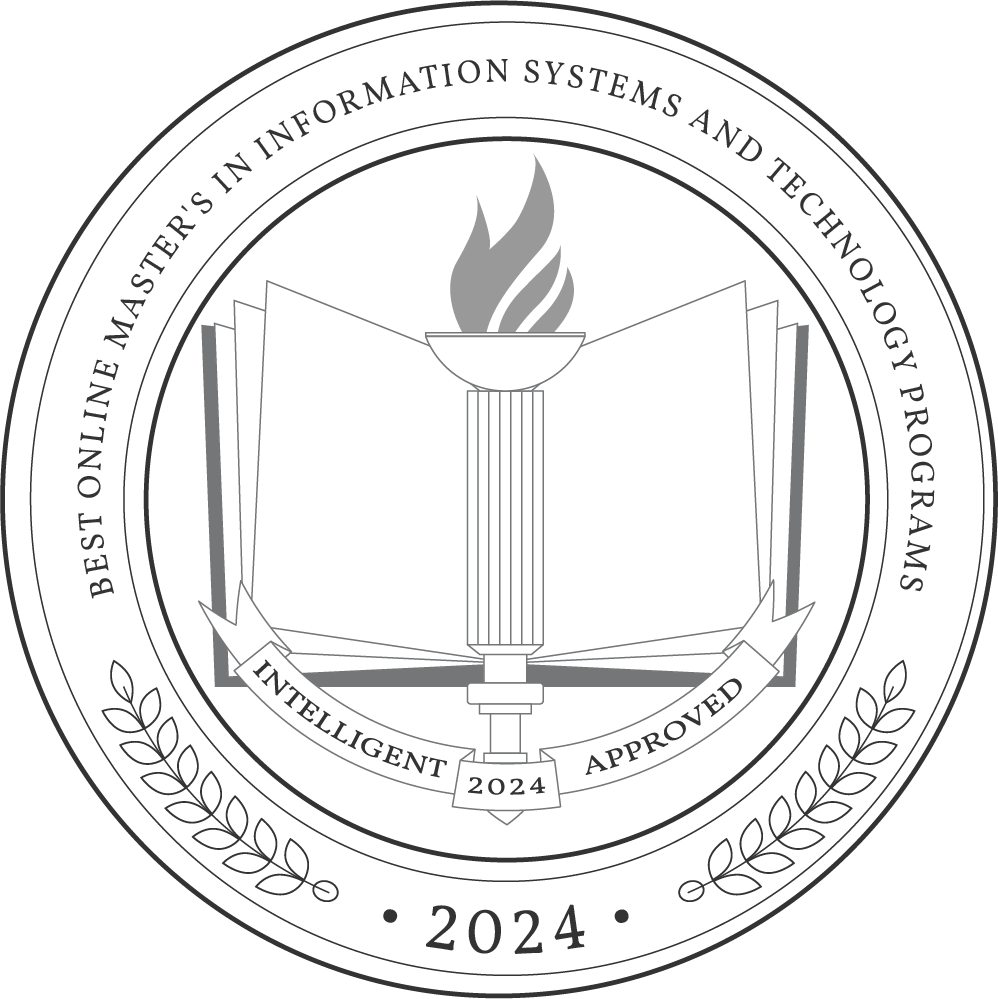Students who complete an online master’s in information systems and technology program will learn the skills needed to attain a senior-level position within the IT field. Because these online programs typically take 30 to 36 credits, full-time students can complete all the necessary coursework within two years, and select accelerated programs are available that allow you to earn your degree in only one year.
According to U.S. News & World Report, this online degree costs $13,000 to $54,000 in total tuition. Once students graduate, they may qualify for high-paying occupations such as computer research scientist, which has an average salary of $136,620.
How to Choose an Online Master’s in Information Systems and Technology Program
Choose your area of study
This degree is typically available as a Master of Science (MS), though some programs offer a Master of Professional Studies (MPS). MS degrees emphasize technical skills and research, while MPS degrees are more oriented to practical applications of knowledge.
Depending on the program, students may be able to choose a specialty area of study. These concentrations typically include information security, data analytics, smart technology, IT management, and web design and application. While all of the online programs will provide students with a strong foundation of knowledge regarding information systems and technology, these specific areas of study can help students customize their education and better prepare themselves for a particular career after graduation. When selecting a program, you should always try to find the best match for your career goals.
Research schools and programs
There is a wide array of online master’s in information systems and technology degree programs available, so students must develop specific criteria to determine which schools they are likely to apply to.
You should only consider institutions that have been approved by a DOE-recognized regional accrediting organization, such as the New England Commission of Higher Education or Northwest Commission on Colleges and Universities. These organizations evaluate schools to ensure they provide students with a high-quality education. Those who attend a school that isn’t regionally accredited may be unable to access financial aid or transfer credits to another institution if needed.
Ideally, your master’s in information systems and technology program will also be accredited by a respected industry group like the Accreditation Board for Engineering and Technology (ABET). This programmatic accrediting organization has particularly high standards for technology education.
Another concern is cost — if students wish to avoid graduating with lots of debt, they should focus on programs that are reasonably within their budget. Beyond these criteria, students may want to focus on programs that offer the schedule flexibility they need to succeed in their remote coursework.
To learn more about any schools that you’re interested in, you can visit the school’s website, contact an admissions counselor, follow the school on social media, or attend an in-person or virtual open house.
Prepare for tests and applications
Application requirements vary by school and program. For example, some online master’s in information systems and technology programs require students to submit GRE test scores. It’s essential to discover whether these test scores are needed and, if so, what the minimum score requirements are for each section. Students who haven’t taken the GRE before should know they may need up to three months to study for it and may have to wait up to 15 days before receiving test results.
Additionally, students should review the application to determine if other paperwork may be required, such as undergraduate transcripts, a personal statement, or letters of recommendation. Before submitting an application, always contact an admissions counselor to ensure you have the most accurate information regarding requirements and deadlines.
Select your program
Students may wish to apply to multiple online master’s in information systems and technology programs, but it’s still important to be selective.
To determine which schools to apply to, students should consider the cost and whether they can afford the program. Students may also consider other factors, including the program’s job placement rate and the school’s reputation within the IT industry. Students may focus on programs taught by influential figures in the field. Such professors may offer a better education, and they can also help students establish a professional network.
Before making your final decision, review your needs and goals again. Do you plan to attend school full-time or part-time? Are you only interested in 100% online programs, or are you fine with a hybrid program that has a few in-person requirements? Some programs offer asynchronous courses, which can be completed at your own pace, while others only offer synchronous courses, which involve remotely attending lectures and completing assignments at the same time as other students — which of these two online learning formats do you prefer? Your school should accommodate your scheduling needs and learning preferences.
Determine how you’ll pay for your degree
Students should fill out the Free Application for Federal Student Aid (FAFSA) each academic year. By filling out this application, most students will automatically qualify for federal student loans, and the FAFSA is sometimes a prerequisite for other forms of aid. These aid forms include most grants and select scholarships, though both are harder to obtain for graduate students. Beyond this, students should contact the school’s financial aid office to inquire about extra aid available through either the state or the school. Those who already work in the field should see if their employer offers tuition assistance benefits as well.
Best 50 Accredited Online Master’s in Information Systems and Technology Programs
Institution Type
Status
- Intelligent Score
- Alphabetically By University Name
- Acceptance Rate
- Enrollment
- In-state Graduate Tuition
- Out-of-state Graduate Tuition
- In-state Undergraduate Tuition
- Out-of-state Undergraduate Tuition

Johns Hopkins Engineering for Professionals
Intelligent Score: 99.54Undergraduate Tuition
In-state: $54,160
Out-of-state: $54,160
Graduate Tuition
In-state: $57,010
Out-of-state: $57,010
Test scores
SAT: 1470-1560
ACT: 34-36
ESTIMATED COST PER CREDIT
$1,957
DELIVERY FORMAT
Online, On-Campus, Hybrid
ACCREDITATION
Middle States Commission on Higher Education
REQUIRED CREDITS TO GRADUATE
30

Florida State University
Intelligent Score: 99.14Undergraduate Tuition
In-state: $4,640
Out-of-state: $19,084
Graduate Tuition
In-state: $9,684
Out-of-state: $9,684
Test scores
SAT: 1220-1350
ACT: 27-31
ESTIMATED COST PER CREDIT
Resident: $444
Non-Resident: $1,075
DELIVERY FORMAT
Online
ACCREDITATION
Association to Advance Collegiate Schools of Business
REQUIRED CREDITS TO GRADUATE
33

Virginia Tech
Intelligent Score: 99.03Undergraduate Tuition
In-state: $32,274
Out-of-state: $36,090
Graduate Tuition
In-state: $44,444
Out-of-state: $44,444
Test scores
SAT: 1210-1410
ACT: 26-32
ESTIMATED COST PER CREDIT
$1,025
DELIVERY FORMAT
Online
ACCREDITATION
Southern Association of Colleges and Schools Commission on Colleges
REQUIRED CREDITS TO GRADUATE
33

UAB Collat School of Business
Intelligent Score: 98.22Undergraduate Tuition
In-state: $10,780
Out-of-state: $30,250
Graduate Tuition
In-state: $10,780
Out-of-state: $10,780
Test scores
SAT: 1070-1330
ACT: 23-31
ESTIMATED COST PER CREDIT
Resident: $468
Non-Resident: $1,109
DELIVERY FORMAT
Online
ACCREDITATION
Southern Association of Colleges and Schools Commission on Colleges
REQUIRED CREDITS TO GRADUATE
30

University of Arizona Eller College of Management
Intelligent Score: 97.87Undergraduate Tuition
In-state: $10,990
Out-of-state: $33,273
Graduate Tuition
In-state: $11,938
Out-of-state: $11,938
Test scores
SAT: 1090-1350
ACT: 21-29
ESTIMATED COST PER CREDIT
$1,332
DELIVERY FORMAT
Online
ACCREDITATION
Higher Learning Commission
REQUIRED CREDITS TO GRADUATE
30

Stevens Institute of Technology
Intelligent Score: 95.26Undergraduate Tuition
In-state: $53,828
Out-of-state: $53,828
Graduate Tuition
In-state: $37,414
Out-of-state: $37,414
Test scores
SAT: 1320-1480
ACT: 31-34
ESTIMATED COST PER CREDIT
$1,776
DELIVERY FORMAT
Online, On-Campus
ACCREDITATION
Middle States Commission on Higher Education
REQUIRED CREDITS TO GRADUATE
36

Boston University
Intelligent Score: 95.16Undergraduate Tuition
In-state: $56,854
Out-of-state: $56,854
Graduate Tuition
In-state: $56,854
Out-of-state: $56,854
Test scores
SAT: 1310-1500
ACT: 30-34
ESTIMATED COST PER CREDIT
$846
DELIVERY FORMAT
Online
ACCREDITATION
New England Commission of Higher Education
REQUIRED CREDITS TO GRADUATE
40

Penn State World Campus
Intelligent Score: 94.57Undergraduate Tuition
In-state: $15,025
Out-of-state: $24,413
Graduate Tuition
In-state: $22,464
Out-of-state: $22,464
Test scores
SAT: 1070-1300
ACT: 24-29
ESTIMATED COST PER CREDIT
$1,007
DELIVERY FORMAT
Online
ACCREDITATION
Middle States Commission on Higher Education
REQUIRED CREDITS TO GRADUATE
33

Ball State University
Intelligent Score: 94.44Undergraduate Tuition
In-state: $9,482
Out-of-state: $26,470
Graduate Tuition
In-state: $9,328
Out-of-state: $9,328
Test scores
SAT: N/A
ACT: N/A
ESTIMATED COST PER CREDIT
Resident: $438
Non-Resident: $656
DELIVERY FORMAT
Online
ACCREDITATION
Higher Learning Commission
REQUIRED CREDITS TO GRADUATE
38

North Carolina A&T State University
Intelligent Score: 94.4Undergraduate Tuition
In-state: $3,540
Out-of-state: $17,050
Graduate Tuition
In-state: $4,745
Out-of-state: $4,745
Test scores
SAT: 960-1130
ACT: 17-22
ESTIMATED COST PER CREDIT
Resident: $233
Non-Resident: $860
DELIVERY FORMAT
Online
ACCREDITATION
Southern Association of Colleges and Schools Commission on Colleges
REQUIRED CREDITS TO GRADUATE
30

UMass Lowell Division of Graduate, Online & Professional Studies
Intelligent Score: 93.75Undergraduate Tuition
In-state: $15,791
Out-of-state: $35,779
Graduate Tuition
In-state: $14,014
Out-of-state: $14,014
Test scores
SAT: 1200-1390
ACT: 27-32
ESTIMATED COST PER CREDIT
$585
DELIVERY FORMAT
Online
ACCREDITATION
New England Commission of Higher Education
REQUIRED CREDITS TO GRADUATE
30

Colorado State University
Intelligent Score: 92.07Undergraduate Tuition
In-state: $9,426
Out-of-state: $28,147
Graduate Tuition
In-state: $10,520
Out-of-state: $10,520
Test scores
SAT: 1070-1280
ACT: 23-29
ESTIMATED COST PER CREDIT
$867
DELIVERY FORMAT
Online
ACCREDITATION
Higher Learning Commission
REQUIRED CREDITS TO GRADUATE
33

University of Cincinnati
Intelligent Score: 90.83Undergraduate Tuition
In-state: $9,723
Out-of-state: $25,057
Graduate Tuition
In-state: $13,224
Out-of-state: $13,224
Test scores
SAT: 1120-1330
ACT: 23-29
ESTIMATED COST PER CREDIT
$916
DELIVERY FORMAT
Online
ACCREDITATION
Higher Learning Commission
REQUIRED CREDITS TO GRADUATE
36-44

West Texas A&M University
Intelligent Score: 90.83Undergraduate Tuition
In-state: $5,748
Out-of-state: $7,195
Graduate Tuition
In-state: $4,968
Out-of-state: $4,968
Test scores
SAT: 920-1130
ACT: 18-23
ESTIMATED COST PER CREDIT
$420
DELIVERY FORMAT
Online
ACCREDITATION
Southern Association of Colleges and Schools Commission on Colleges
REQUIRED CREDITS TO GRADUATE
30

Marquette University
Intelligent Score: 90.72Undergraduate Tuition
In-state: $44,970
Out-of-state: $44,970
Graduate Tuition
In-state: $21,690
Out-of-state: $21,690
Test scores
SAT: 1160-1340
ACT: 25-30
ESTIMATED COST PER CREDIT
$1,245
DELIVERY FORMAT
Online, On-Campus
ACCREDITATION
Higher Learning Commission
REQUIRED CREDITS TO GRADUATE
30

Sam Houston State University
Intelligent Score: 90.33Undergraduate Tuition
In-state: $5,856
Out-of-state: $15,672
Graduate Tuition
In-state: $5,765
Out-of-state: $5,765
Test scores
SAT: 970-1120
ACT: 18-23
ESTIMATED COST PER CREDIT
Resident: $725
Non-Resident: $1,133
DELIVERY FORMAT
Online, On-Campus
ACCREDITATION
Southern Association of Colleges and Schools Commission on Colleges
REQUIRED CREDITS TO GRADUATE
30

Auburn University Harbert College of Business
Intelligent Score: 90.16Undergraduate Tuition
In-state: $10,080
Out-of-state: $30,240
Graduate Tuition
In-state: $10,080
Out-of-state: $10,080
Test scores
SAT: 1160-1320
ACT: 25-31
ESTIMATED COST PER CREDIT
$900
DELIVERY FORMAT
Online
ACCREDITATION
Southern Association of Colleges and Schools
REQUIRED CREDITS TO GRADUATE
30

University of Missouri
Intelligent Score: 90.01Undergraduate Tuition
In-state: $9,330
Out-of-state: $27,612
Graduate Tuition
In-state: $9,478
Out-of-state: $9,478
Test scores
SAT: 1110-1320
ACT: 23-29
ESTIMATED COST PER CREDIT
$1,200
DELIVERY FORMAT
Online
ACCREDITATION
Higher Learning Commission
REQUIRED CREDITS TO GRADUATE
30
How We Rank Schools
Since information systems is a STEM field, advanced degrees in the subject are typically Master of Science (MS) degrees. However, you can also earn a Master of Professional Studies (MPS). All of the programs we reviewed are regionally accredited schools to ensure the quality of the programs.
We reviewed both 100% online and hybrid programs. To determine our rankings, we evaluated each program’s cost, course strength, reputation, faculty, and flexibility and gave them an Intelligent Score on a scale of 0 to 100. For a more extensive explanation, check out our ranking methodology.
What Can You Expect from an Online Master’s in Information Systems and Technology Program?
Students earning an online master’s in information systems and technology degree can expect coursework emphasizing collaborative projects in which they work closely with fellow students. The courses build on students’ computer and IT knowledge while providing them with the knowledge and experience necessary to attain a senior-level position within the industry upon graduation.
Some programs will require students to complete a capstone course that helps to demonstrate their readiness to enter the workforce in a leadership position. Fortunately for remote students, most of these programs do not require any on-campus labs.
If students can attend such a program full-time, they should be able to complete all of the necessary coursework in two years, and part-time students should expect to take three years. Students who enroll in an accelerated program can complete the coursework in just one year.
Potential courses you’ll take in an online master’s in information systems and technology degree program
- Advanced Database Management Systems. This course builds on existing database management systems knowledge and helps students learn more about skills such as cover indexing, concurrency control, information modeling, database security, and transaction and locking.
- Information Systems Development. This course covers the development life cycle as a whole, all while providing hands-on practice with specific methodologies and techniques relevant to the field, including agile and structured analysis.
- Analyzing Big Data. This course helps students learn how to analyze big data in order to discover information relevant to specific business interests. To do this, the class uses numerous examples from real business cases, allowing students to learn the most effective analytical tools and techniques.
- Data Visualization & Reporting. This course walks students through using popular data visualization tools such as Tableau and Python Bokeh.
What Can You Do With an Online Master’s in Information Systems and Technology?
Career outlook
The field of information systems and technology is at the forefront of driving innovation, efficiency, and security in the digital age. Earning an online master’s degree in information systems and technology equips individuals with the knowledge and skills to design, implement, and manage cutting-edge technology solutions for organizations.
As organizations increasingly rely on technology to streamline operations, enhance cybersecurity, and stay competitive, there is a growing demand for professionals who can navigate the complexities of information systems. An online master’s degree in information systems and technology opens the door to various career paths, each contributing to the advancement of technology and its strategic application in organizations. Here are some common career options:
- Information systems manager — Assess an organization’s technology needs, plan IT projects, and hire and supervise IT staff.
- Median annual salary: $164,070
- Projected employment growth (through 2032): 15%
- New job openings projected: 46,900 annually
- Information security analyst — Monitor networks, identify vulnerabilities, train staff on how to prevent security breaches, and recommend security upgrades.
- Median annual salary: $112,000
- Projected employment growth (through 2032): 32%
- New job openings projected: 16,800 annually
- Computer network architect — Design, implement, and upgrade data communication networks.
- Median annual salary: $126,900
- Projected employment growth (through 2032): 4%
- New job openings projected: 10,200 annually
Online Master’s in Information Systems and Technology Degree Frequently Asked Questions
How do I apply to an online master’s in information systems and technology degree program?
Students can apply to an online master’s in information systems and technology program by accessing the application on the university website. The application should specify the requirements, including undergraduate transcripts, GRE scores, and a cover letter. Some applications may require students to submit letters of recommendation and application essays.
To verify that the application is complete, students should strongly consider contacting the admissions office for the school(s) they are interested in. The counselor who answers should be able to handle any additional questions regarding the application or the school.
How much does an online master’s in information systems and technology degree cost?
According to U.S. News & World Report, the cost of this online degree ranges from $13,000 to $54,000 in total tuition. Generally, private schools will be more expensive than public schools. At public schools, out-of-state students will almost always have to pay more than in-state students. And the exact cost of a degree may be affected by other factors, including how long the student takes to complete classes and how many credit hours the degree requires.
How long does it take to earn an online master’s in information systems and technology degree?
Students attending full-time can usually complete their online master’s in information systems and technology degree program in two years. Part-time students may need about three years to complete everything. Students may be able to find accelerated programs that are designed to be completed in one year, which are a good fit for those trying to finish the degree quickly.
Ultimately, students need to be honest about how much time they can devote to their studies and choose the appropriate program. That way, the student won’t have to worry about accidentally falling behind in their studies.
Is an online master's in information systems and technology worth it?
Graduates with a master’s in information systems and technology have the opportunity to play pivotal roles in shaping the technological landscape of organizations. Their expertise is essential in driving innovation, ensuring cybersecurity, and leveraging technology for strategic advantage. The diverse career paths in this field offer opportunities for professionals to contribute to the success and efficiency of organizations across various industries.
Many positions in IT are growing at rates that far outpace the economy as a whole, and these occupations often offer exceptionally high salaries as well.
There are many benefits to earning your master’s in information systems and technology degree online. Online programs offer a higher level of flexibility and can be an excellent choice for adult learners who have other personal or professional commitments. Also, this learning format attracts a diverse pool of motivated students, enhancing networking opportunities and connecting students with peers, professors, and industry professionals worldwide.
